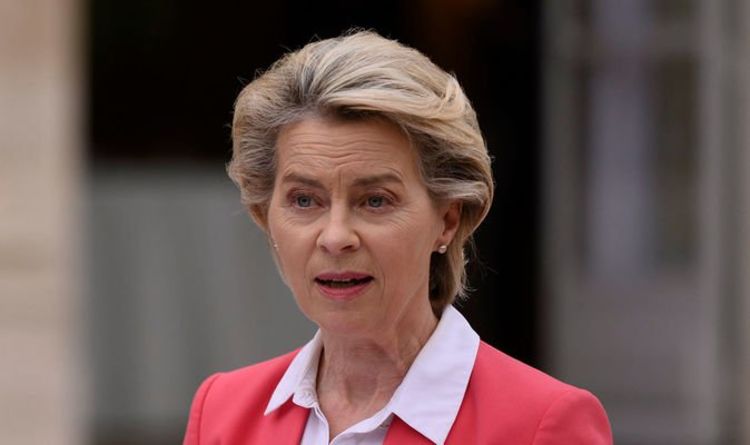Ursula von der Leyen details Next Generation EU recovery plan
We use your sign-up to provide content in ways you’ve consented to and to improve our understanding of you. This may include adverts from us and 3rd parties based on our understanding. You can unsubscribe at any time. More info
The EU’s mass vaccination programme is now in full swing after a shaky start. Brussels initially lagged behind the rest of the developed world. Officials initially blamed a lack of communications between the bloc and vaccine manufacturers, with some going as far as to accuse the bloc of bureaucracy.
It has now passed many countries in its efforts, however, including the US in terms of first and second doses per 100 people, and should outdo the UK in the next few weeks if it maintains its current rate.
Many say it was inevitable that the EU would at first find it difficult; a result of its political makeup.
Some 16 years ago, Giandomenico Majone, an Italian professor of political science, observed that the ends and means of policymaking are reversed in the bloc.
While states like the UK pushed ahead with vaccine procurement in order to serve those who voted leaders in, voters in the EU by contrast have little direct say on the legislative direction of the bloc.


Chris Bickerton, a lecturer at Cambridge University who focuses on internal relations, comparative politics and Europe, claimed the means in the COVID-19 scenario translated to the European Commission, led by Ursula von der Leyen, seeking greater control over the bloc’s health policy.
This was, he said, what Professor Majone called “integration by stealth.”
It was a way for the EU to tackle problems wrongheaded, with the ultimate outcome to implement new policy, and by extension further unite member states, he said.
Even EU leaders, as seen in a state of the union speech last year, suggested that a centralised vaccine strategy would help the EU to find meaning and a position on the international stage.
JUST IN: EU ticking time bomb as bloc ‘as we know it won’t exist in 2023’

In the speech, Ms von der Leyen placed special emphasis on “unity” and “community”, and talked of “how fragile our community values really” were as a result of the pandemic.
She added: “The moment for Europe to lead the way from this fragility towards a new vitality.”
Analysts have noted that the EU has relatively little influence in a global political world.
Professor Julian Lindley-French, an internationally recognised strategic analyst and advisor in defence, previously told Express.co.uk that the tools Ms von der Leyen and the EU had on the international stage were “extremely limited beyond declaratory comments”.
DON’T MISS
Escaping EU to launch vaccination drive ‘connected’ to economic boost [REPORT]
Taliban’s crackdown: Faces of women brutally defaced at beauty salon [INSIGHT]
Navy on high alert as Russian spy ship near Ireland [ANALYSIS]


And while the EU’s vaccine “gamble”, as Mr Bickerton described it, didn’t pay off initially, it has now transformed into a success.
But, earlier this year, when the EU waged a short-lived vaccine war against the UK, and vaccines on the continent went wasted, Dr John McCauley said Ms von der Leyen and her colleagues’ actions were risking people’s lives.
The Director of the Worldwide Influenza Centre, a World Health Organisation (WHO) Collaborating Centres for Influenza told Express.co.uk: “We’ve got to bear in mind what Jonathan Van Tam said: that there’s no point in having vaccines sitting in the fridge, because it does nothing.

“You need it in people’s arms. Everyday is a delay. People die every day.
“You stop vaccinating for a day, it isn’t those people, but it’s the people in the future.

“People are going to die because of a one day delay that they needn’t have done.”
However, by July, the EU met its target of administering one jab to 70 percent of adults, and is on target to fully vaccinate 70 percent of all adults.
Source: Read Full Article





